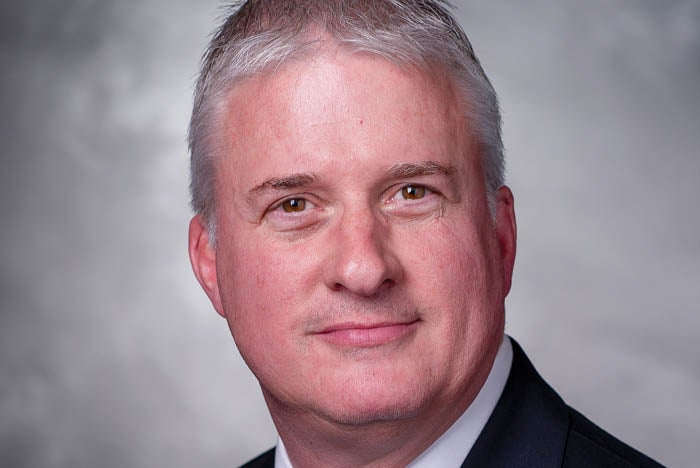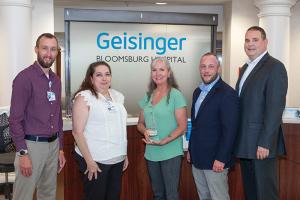Paving the way to success for all EVS professionals

The Winnie File
CV
- Director, environmental services, Crothall Healthcare, Tenet Healthcare, Dallas
- Manager, environmental services, Aurora Health Care, Aurora Sinai Medical Center, Milwaukee
- Director, environmental services, Sodexo Healthcare, Wheaton Franciscan Healthcare, Glendale, Wis.
Accomplishments
- AHE president for 2020-2021
- AHE at-large board member 2014-2019
- Certified Health Care Environmental Services Professional (CHESP)
- Certificate of Mastery in Infection Prevention (CMIP)
Education
- Master of business administration, University of Phoenix
- Bachelor of science in business finance, University of Phoenix
Brad Winnie, MBA, CHESP, is an environmental services (EVS) director at Crothall Healthcare and longtime Association for the Health Care Environment (AHE) member and volunteer who was elected 2020-2021 president. In this issue, he discusses with HFM how the association continues to be the leading voice in EVS.
You have a long history in this field. What led you to your current position?
I started my professional career when I was around 12 and began cleaning the neighborhood dry cleaning store.
The proprietor was like a grandmother to me. I cleaned her store, decorated the windows for holidays and did lunch runs to the restaurant down the street. It was a great few hours on a Saturday, and it helped me learn the basics of detail and first impressions.
When I turned 16, I started in the janitorial business where my mother worked, and I moved up to become a manager within a few years. That morphed into a desire to operate my own cleaning business. I grew that business from the ground up and began cleaning medical offices for a hospital.
When the opportunity presented itself, my business merged with another company. I decided health care would be my permanent profession. A few years later, I was promoted from operations manager to director where I am today.
I prefer to work in health care because of the human element, being a large contributor to patient care and staff development. I have it in my heart to make a difference. I have a nurse in my family, but EVS is my way to be a part of the nonclinical side of health care while remaining as equally important in the patient healing and recovery process.
When did you become involved in AHE and start serving in leadership positions?
A previous employer contracted with AHE for bulk memberships and required all managers be certified. I enjoyed the teamwork and support that employer provided to learning and professional development. I earned the Certified Health Care Environmental Services Professional (CHESP) designation, accelerated my learning curve in health care and was fortunate to attend my first AHE conference in Orlando, Fla., in 2004.
The networking and educational opportunities offered at the conferences have made a measurable difference in my career. That is what encouraged me to give back and contribute to the association.
After a number of years serving on numerous committees and volunteering, I decided to run for the AHE board and be strategically engaged in AHE’s future. I was elected president-elect in my second board term and will serve a two-year term through 2021.
What initiatives or changes in the field would you like to spearhead during your presidency?
AHE is extremely dedicated to personal and professional growth of AHE members and the profession as the recognized authority in EVS and environmental infection prevention. This dedication is the driving force of AHE’s mission to advance members’ ability to establish and maintain health care environments that are free of surface contamination to support safety, service and efficient, effective operations.
In today’s health care environment, it is not OK just to be a leader in the field of EVS. We need to be experts in EVS operations as well.
Budgets can shrink quickly, and resources are often scarce. Capital for replacing equipment and adding new technology is not as easy to get approved. Our EVS directors are business leaders and need to be CEOs of their departments.
We need to be able to demonstrate the return on investment and value of equipment and services, and justify aspects of existing operations to find efficiencies that drive the success of the larger hospital organization. As our departments are asked to do more with less, we need to find more efficient and effective means of getting things done. Innovation and problem-solving is what we do best, and that is what we will continue to drive with our members.
AHE’s core values are to help build the experience and reputation of not just the members but health care EVS as a whole. It is essential for members to contribute to the knowledge base as AHE continues to be the trusted source of information.
We partner with other professional organizations that look to AHE to develop new practice standards, and I look forward to continuing that dialogue to expand AHE’s sphere of influence within the American Hospital Association as well as externally.
How has AHE helped to elevate the field of EVS?
AHE’s commitment is to a pathogen-free healing environment across all care settings. We continue to enhance the profession in elevating the standards and knowledge of our members and by promoting the tangible and intangible value of EVS to health care delivery.
The former terminology of “janitors” or “housekeepers” cleaning the hospitals is a view of the past. AHE members are the authority in the field of health care environmental cleaning.
We have delivered training and other opportunities to train and certify leaders, front-line staff and suppliers to demonstrate the core competencies of EVS. These competencies are needed in the demanding health care environment today and in the future.
AHE’s new signature programs of Certified Health Care Environmental Services Technician (CHEST) and Certified Surgical Cleaning Technician (CSCT) are driving improvements in the quality of front-line staff performance so they too can be viewed as professionals in their daily duties
AHE also forged a relationship with The Ohio State University, which has added health care EVS to the hospitality program. This program will open up opportunities for new students to explore the potential of a career in health care.
Also, the need for further education in real time continues to be a demand. Today’s pandemic and new scenarios are changing the way EVS professionals operate on a daily basis.
These often unforeseen changes require all professionals to be on top of their games at all times. AHE is driving and leading that education not only with programming but with reports and white papers. We work to exchange that knowledge and information to members quickly.
How is AHE continuing to serve its members in the face of a pandemic?
As a strategic imperative, AHE is always looking to expand and enhance the value of membership greater than the investment of time and money. We continue to drive information that is evidence based and peer sourced.
As we know, this pandemic has created challenges to getting out the most up-to-date information as quickly as possible. It is essential members have what they need, when they need it, which is why we created the COVID-19 Resources for EVS Professionals on the AHE website.
The pandemic also impacted how AHE delivers its core programs. Travel has been eliminated and training dollars have been reduced like never before. This has prompted us to challenge our thinking and be innovative in providing our members with the best education delivered in different ways.
It might be a while before in-person training classes or conferences resume, but AHE will continue to roll out the best education in the most effective way possible.
What value can EVS leaders bring to their hospitals during this time?
Being a leader in all senses of the word is what we need today. It is time for all environmental services leaders to stand up and help drive the future of our industry. Be true professionals and learn all aspects of what it takes to be that CEO of our business. As our C-suite leaders are reaching out and asking the questions, we must have the answers and the knowledge. Health care changes drastically every day, and environmental services leaders must remain valuable to their organization.



